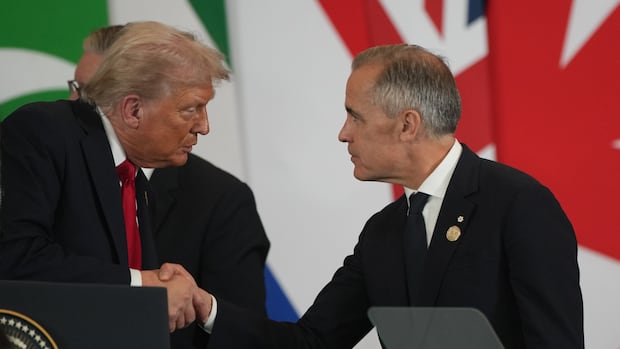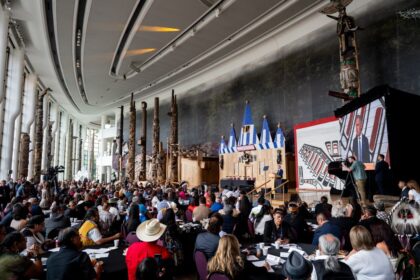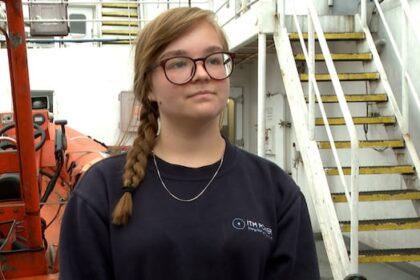WorldMonday was an emotional day for Canadians with family in Israel and Gaza, as a peace deal was signed alongside the release of Palestinian prisoners and Israeli hostages. But as some celebrated with cautious optimism, experts remained skeptical that the deal with lead to lasting peace in the region. Experts warn the deal in its current state does not set the stage for lasting peaceKevin Maimann · CBC News · Posted: Oct 14, 2025 4:00 AM EDT | Last Updated: 5 hours agoU.S. President Donald Trump, left, is shown with Prime Minister Mark Carney during a summit in Sharm el-Sheikh, Egypt, on Monday, held to support ending the Israel-Hamas war in Gaza after a breakthrough ceasefire deal. (Amr Nabil/The Associated Press)Monday was an emotional day for Canadians with family in Israel and Gaza as a peace deal was signed alongside the release of Israeli hostages and Palestinian prisoners.But while celebrations were marked with cautious optimism, some experts were skeptical that the deal will lead to lasting peace in the region.Maureen Leshem of Toronto, whose cousin Romi Gonen was taken hostage by Hamas on Oct. 7, 2023, and held for 15 months, said she felt a “rush of gratitude” and “overwhelming relief” on Monday, calling the peace deal a victory for all humanity.”We are being surrounded right now by family and love, and we’re all trying to absorb this day and this moment in our own way,” she told CBC News Network. “This day definitely carries relief, but there are layers and layers of memory, of pain, of fragile hope.”Louay Alghoul of Winnipeg, who lost 139 family members to Israeli attacks in Gaza since Oct. 7 and has other family members still unaccounted for, told CBC News Network that he had “mixed feelings.””I’m very happy that the the bombing has stopped, but it doesn’t seem like it’s going to be an everlasting peace — although I truly hope that I’m wrong,” he said. WATCH | Trump signs peace deal as hostages, prisoners exchanged:Trump, mediators sign Gaza peace deal as Hamas, Israel release hostages and prisonersU.S. President Donald Trump and mediators signed a deal to end the war in Gaza on Monday following the release of the remaining 20 living Israeli hostages and 2,0000 freed Palestinian prisoners.While Alghoul does not trust that the peace deal will amount to anything more than a temporary ceasefire, he said he’s grateful his family members can have a “breather,” with food and medication being allowed into Gaza.U.S. President Donald Trump visited the Knesset, Israel’s parliament, to enthusiastic fanfare before flying to Sharm el-Sheikh in Egypt on Monday for a world leaders’ summit, where he signed a document officially ending the two-year war in Gaza.Trump has said his 20-point peace plan to end the conflict will create “eternal peace” in the Middle East.Trump waits to greet world leaders at Monday’s summit in Egypt. (Yoan Valat/Pool/Reuters)Prime Minister Mark Carney was among the world leaders in attendance, with nearly three dozen countries represented.In a statement, Carney called the summit a “historic moment” that “opens a new chapter of hope for Palestinians and Israelis.””As we build on today’s progress, we must immediately turn our focus to the next steps of greater humanitarian relief, security and development,” he said. “The road to stability and peace remains long, but this is a vital first step.” Upbeat reaction to plan ‘a gross distortion’ Alghoul said while the release of hostages and prisoners is a “great step towards a peaceful solution,” he doesn’t trust Israeli Prime Minister Benjamin Netanyahu or his government to broker peace, especially when Palestinians did not play a role in drawing up the plan.Nader Hashemi, an associate professor of Middle East and Islamic politics at Georgetown University in Washington, D.C., said Palestinians need to be at the table for a plan to lead to lasting peace.He said that describing Monday’s deal as unprecedented and a framework for long-lasting regional peace is “a gross distortion of both the historical record on this conflict and what Trump’s peace plan actually is all about.” Hashemi said several U.S. presidents — including Jimmy Carter, Bill Clinton and George W. Bush — made similar claims in the past in deals that actually paved the way for the violence of the last two years.”They’ve avoided steadfastly an international law framework for solving this conflict — and critically, they’ve ignored the roots of this crisis: the question of occupation and the denial of the rights of the Palestinians to statehood,” he told CBC News Network.Much of the international community, including Canada, has called for a two-state solution, which Netanyahu rejects.WATCH | UNICEF spokesperson on what’s needed in Gaza:’Need is immense’ in Gaza as ceasefire holds, says UNICEF spokespersonTess Ingram, a spokesperson for UNICEF in Gaza City, says people are returning home after the announcement of a ceasefire to find entire neighbourhoods lacking the food, water and clothing needed to survive the coming winter. Hashemi said the peace deal is largely an Israeli plan, drawn up with the Trump administration and input from Arab dictators. He said he expects a temporary pause in the fighting and that in a few months, “we’re going to be back to where we started from.”Citing United Nations reports saying it could take 15 years just to clear the rubble out of Gaza, he questions how the region will be rebuilt in a way that could sustain Palestinians who live there.”What’s going to happen to the two million people there who are starving and now are returning to their homes to find they don’t exist?” Hashemi said.”What are they supposed to celebrate in any sort of meaningful way? It’s impossible to sustain human existence in Gaza because of what the Israeli army and Netanyahu have done to that small piece of territory over the last two years.”Many details yet to be worked outNomi Bar-Yaacov, an international peace negotiator, arbitrator and mediator, is also skeptical of the deal, saying it marked a “bizarre moment” with big speeches and announcements but no co-ordination in terms of how to move forward.”It really is all about the implementation. And there’s no implementation mechanism in this 20-point plan,” Bar-Yaacov told CBC News Network.She added that it will be crucial to have a “stabilization force” in Gaza that is capable of overseeing the transition.”There is an urgency in getting the stabilization force and the police in with a very, very clear mandate. And as of present, there is no agreed mandate.”Michael Lynk, an associate law professor at Western University in London, Ont., and former special UN rapporteur for the human rights situation in the Palestinian territories, said the peace plan does not rely enough on international law and UN resolutions related to Israel and the occupied Palestinian territories.Lynk told CBC News Network that the hard questions are “what happens next” and whether the Trump administration “has staying power, the political endurance, to see this through [to] the end.”ABOUT THE AUTHORKevin Maimann is a senior writer for CBC News based in Edmonton. He has covered a wide range of topics for publications including VICE, the Toronto Star, Xtra Magazine and the Edmonton Journal. You can reach Kevin by email at kevin.maimann@cbc.ca.With files from Anya Zoledziowski and CBC News Network
Friday, 6 Feb 2026
Canada – The Illusion
Search
Have an existing account?
Sign In
© 2022 Foxiz News Network. Ruby Design Company. All Rights Reserved.
You May also Like
- More News:
- history
- Standing Bear Network
- John Gonzalez
- ᐊᔭᐦᑊ ayahp — It happened
- Creation
- Beneath the Water
- Olympic gold medal
- Jim Thorpe
- type O blood
- the bringer of life
- Raven
- Wás’agi
- NoiseCat
- 'Sugarcane'
- The rivers still sing
- ᑲᓂᐸᐏᐟ ᒪᐢᑿ
- ᐅᑳᐤ okâw — We remember
- ᐊᓂᓈᐯᐃᐧᐣ aninâpêwin — Truth
- This is what it means to be human.
- Nokoma











